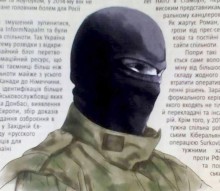Incredibly, March 29 marks the third anniversary of the InformNapalm international volunteer project. It is just difficult to imagine that Russia’s hybrid war against Ukraine, which prompted the establishment of this resource, has been going on so long.
In this period, the project team that comprises dozens of volunteers from various countries has made public a lot of high-profile investigations. The global media willingly use these materials which are also presented at important international forums (for example, the project submitted a report to the Parliamentary Assembly of the Council of Europe past year). The Day asked Roman Burko about the results of InformNapalm’s work and the challenges the team is facing today.
“IMPORTANT INFORMATION MAY REACH HUNDREDS OF THOUSANDS OF PEOPLE”
InformNapalm has made public dozens of important investigations. What do you personally consider as the project’s main achievement?
“It seems to me that our main achievement is not high-profile investigations but, above all, the formation of a unique international volunteer team that has gained strength in the three flaming years. ‘The sinews of war are not gold, but good soldiers; for gold alone will not procure good soldiers, but good soldiers will always procure gold’ – this statement of the Italian philosopher Niccolo Machiavelli clearly depicts the essence of InformNapalm’s work. The team’s volunteers have built – on enthusiasm alone – a system of effective informational work, which may arouse envy in the well-funded and powerful governmental organizations.”
What is the project’s audience now?
“Quantitatively, our resource’s audience varies between 10 and 40 thousand visitors a day, depending on the concrete investigation. In this aspect, we mostly cater for the journalists who pick up our materials and spotlight the issues in news outlets. Thanks to them, important information may reach hundreds of thousands of internet users. It is also important that our investigations are published in many languages.
“But, apart from the quantitative assessment of the audience, we also consider it effective that our materials are read in various points of the world by political, informational, and military decision-makers. For example, we can see by IP addresses that users from NATO ministries of defense regularly visit our website. Our information is also of interest to the European Parliament, various army and police structures of Ukraine, Georgia, the US, and many other countries.”
“RUSSIA IS PLAYING A GLOBAL GAME TO DESTABILIZE THE SECURITY ENVIRONMENT”
The project broaches the problems of not only Ukraine. What international subjects should be brought into focus?
“We are interested in any subjects related to Russia’s overt or covert aggression not only against Ukraine, but also throughout the world. For example, such things as attempts to destabilize the Balkans, informational attacks in the EU countries, military operations in the Middle East, draw the attention of InformNapalm investigators.
“Russia is now playing a global game to destabilize the security environment in various points of the globe, so our mission is to expose the aggressor’s plans or covert actions on our level.”
In what way do you think Ukraine should strengthen its “informational front”?
“We must act asymmetrically. It is not worthwhile to establish ministries and other governmental or military institutions to try to influence these processes. This kind of institutions cannot successfully compete with nongovernmental organizations and communities which work more flexibly and efficiently. Therefore, instead of wasting resources, it would be perhaps better to focus on the areas, where Ukrainians really need to be cared for by the state, such as improvement of social conditions, the level of medicine and education, support for innovations, technologies, production, etc. This is the main ‘informational front’ for the state. As for all the other challenges, Ukrainians can respond to them by way of self-organization.”
THERE IS AN INTENTION TO SET UP AN INTELLIGENCE ANALYSIS CENTER
Denis Ivashin, editor of InformNapalm’s Belarusian bureau, was arrested in Minsk recently. How often do the members of your team face risk?
“Every volunteer in the team can choose whether or not to publicize their activity. Publicity or anonymity is the personal choice of each volunteer, which we respect. A very bold and energetic journalist, Denis decided to publicly defend his civic attitude. Unfortunately, like many other journalists, he was unlawfully arrested on Freedom Day in Belarus. He is a fighter in spirit, which his pretrial interview proves. He managed to reverse the course of the trial and carry out his own ‘investigation.’ As a result, Denis was sentenced to five days of administrative detention and freed on March 30.
“In the past three years, none of our volunteers have been victimized for activities as part of this project in any country of the world, although the majority takes a very captious attitude to the question of anonymity.
“Of course, we always receive threats of physical violence from various pro-Russian internet users, but each volunteer takes care of his or her security.”
How do you intend to develop InformNapalm?
“We should strengthen the analytical component, make foreign-language bureaus more self-sufficient, set up new cells of the project in various countries, and attract financial donors, only on condition of non-interference into the resource’s editorial policy, for it is extremely important for us to remain independent.
“One of the long-term intentions is to establish, if necessary, an international nongovernmental intelligence analysis center on the basis of InformNapalm in order to collect and process information that will help forecast hybrid challenges, and to form a flexible system of responding to them worldwide. One more goal is to establish an effective security and communication system for the Baltic-Black-Sea-axis countries. But this requires considerable resources and, therefore, we remain an independent volunteer community which has shown rapid development in the past three years and made a notable contribution to the future victory over the Russian aggressor.”







